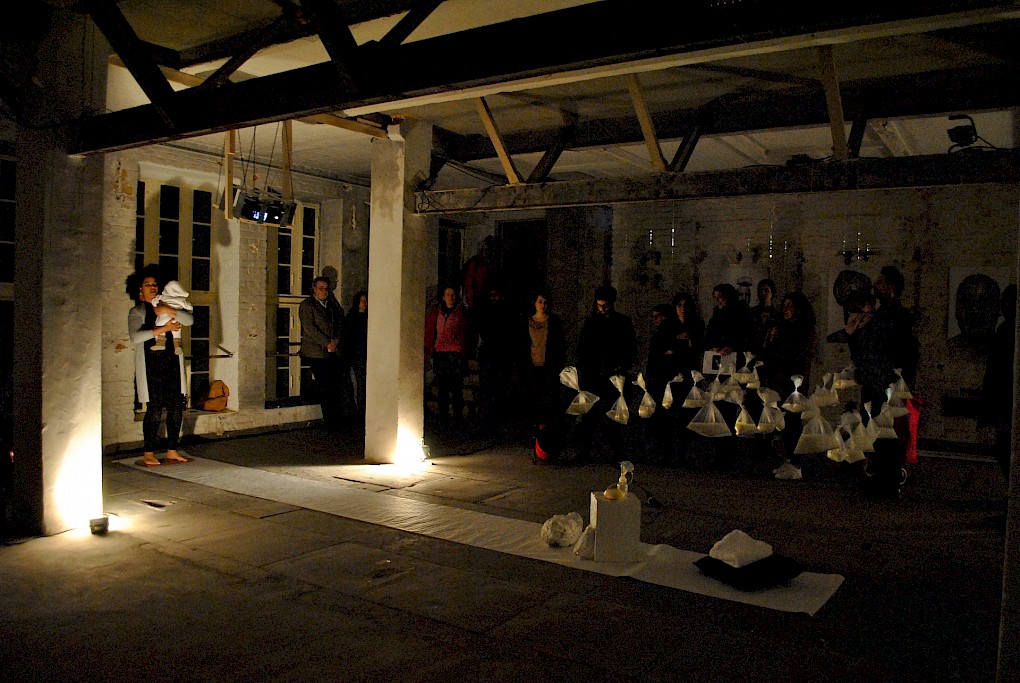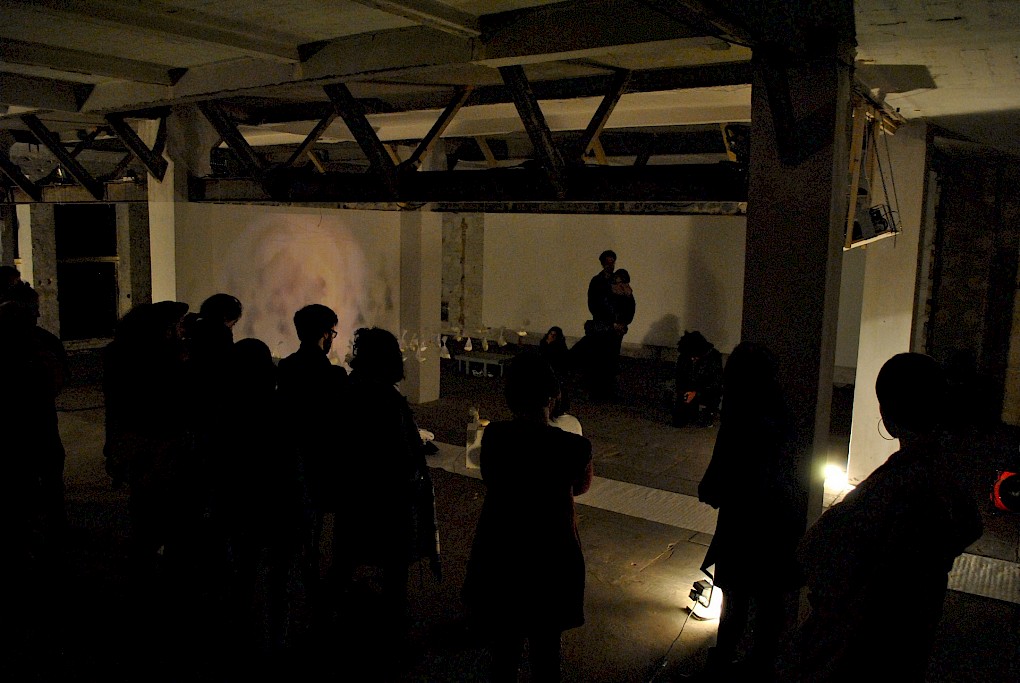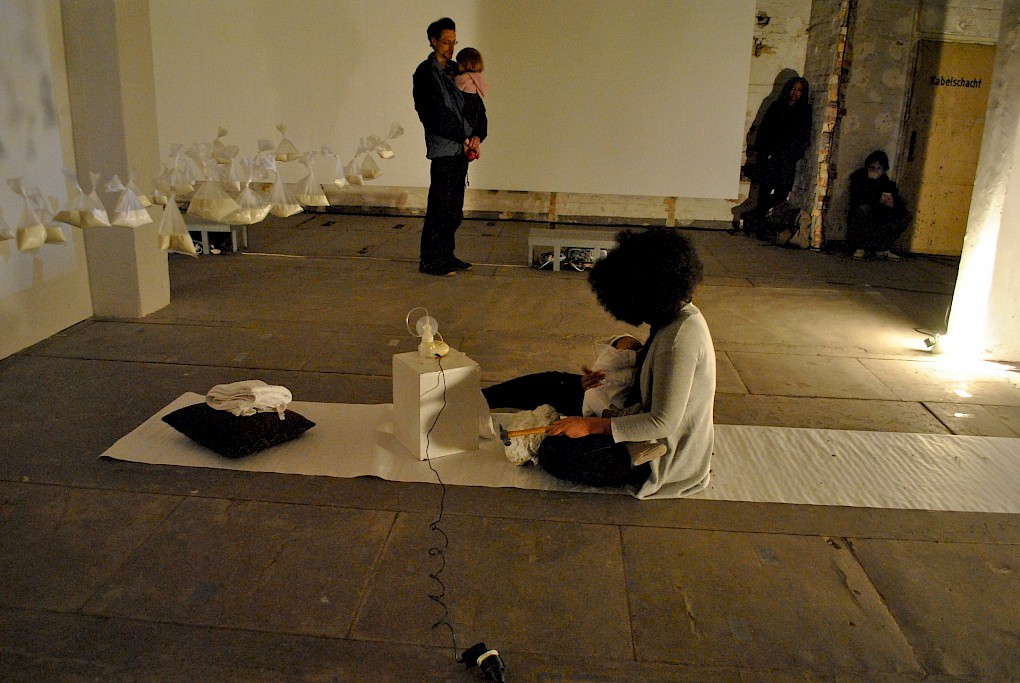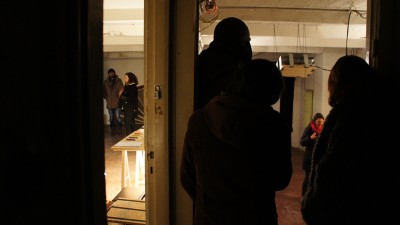Pietà:
About transformation, strength, affection, the mother and the child
PRESENT TENSE SERIES III 26.03.2014 19:00
with Nathalie Mba Bikoro
Curator Chiara Cartuccia
The child is innocence and forgetting, a new beginning, a game, a self-propelled wheel, a first movement, a sacred “Yes.” For the game of creation, my brothers, a sacred “Yes” is needed: the spirit now wills his own will, and he who had been lost to the world now conquers his own world.
On Wednesday, March 26, within the frame of Present Tense Series, Nathalie Mba Bikoro will present the second part of the performance installation “Pietà; The Hammer, Mother & Child”. Divided into two phases, the performance piece is the result of Bikoro’s investigation of maternity as a catalyst of intensity, which summarizes the main traits of life, focusing on its paradoxical aspects. Bikoro’s narrative depicts the act of giving birth as a personal, arduous journey of transformation, which comes to be representative of human strength as a capacity to unflinchingly accept life in all its painful and joyful facets.
Similar to Michelangelo’s masterpiece that inspires the title of this performance, Bikoro’s apparently violent act of hitting the stone does not produce a destructive effect: the hammer does not destroy, but it rather releases a secret life incarcerated in the stone. The material, the white rock, undergoes transfiguration, but it doesn not evolve into something absolutely different. Instead, what the viewer witnesses is a metamorphosis that becomes possible only through a measured mixture of variation and continuity. Nothing comes from nothing: in the same way that the origins can always be traced in the final product, any kind of historical progress, personal or collective, stems from an organic dialogue between the old and the new, between past and present. According to Benjamin, “history is the object of a construction whose place is formed not in homogenous and empty time, but in that which is fulfilled by the here-and-now [Jetztzeit]” (Walter Benjamin, On the Concept of History, translated by Dennis Redmond, original German version Frankfurt am Main: Suhrkamp Verlag, 1974)
In this context, the extreme, radical mutation symbolized by birth, a “no-being” that becomes “being”, is used as a premise for artistic and conceptual investigation. Bikoro elaborates an intimate system of correspondences between herself (creator, both as mother and artist), the new-born (a vivid manifestation of life at its most), and the stone, an inanimate object shaped by creative intentions (the son of art and imagination). The performative gesture closes the symbolic circle of the elements, gives them unity, and sets the entire process to action. The act of change is a state of constant movement, although this flux is always inherent to each singular instance, and in this sense eternally fixed. This is the reason why once we encounter death in life, we are unable to distinguish between the two: same as the love for the present moment always implies a memory about the things passed, presence is nothing without absence. After all, the concept of resurrection is essentially nothing else, but a declaration of awareness of the ultimate unity of these two opposites. This in mind, the title of the performance “Pietà” sounds almost ironical, since it intentionally makes the viewer think of mourning and grief, although the default theme of the artwork is birth and new life.
Life derives its forms from experiences (the figure of the mother) as well as from expectations (the stone and the child). Death and birth are both liminal moments, which elucidate the coexistence of temporalities in a man’s lifetime. This blurry edge between living and not-(yet)-living is a perfect place for creation, since it is open to possibility and novelty, which Bikoro’s artistic intervention intends to represent.
Nathalie Mba Bikoro (b. 1985 in Libreville, Gabon) is an interdisciplinary artist, whose artwork aims to bring together communities by collecting fractured narratives for the sake of social change through identity, memory, dialogue, history and multilingualism. Her personal experiences facilitated her sensibility to cross-interculturalism and languages, which she explores to deconstruct and re-construct mythologies of both past and present. In her artistic practice the narratives examine the eternal returns of historical and visual stereotypes throughout art history, and the ways they influence current societies and interactions. The ultimate purpose is not to resolve the colonial contexts, but rather expose fragile nuances of the political, in order to foster the legacy of celebrating the multiplicity of voices and cultural identities, as well as challenging conceptions of origin, authenticity and ritual.
Bikoro participated in numerous international exhibitions and festivals, among others Perpendicular Brazil (2011), African Heritage London (2010) and Museum Africa Johannesburg South Africa (2011), EPAF11 Warsaw Poland (2011) and Dak’Art Biennale 10th edition (2012). Nathalie Bikoro is a practicing curator for Contemporary Visual Arts, and an Associate Lecturer (Greenwich University London, South Bank University London and Richmond Adult College).




